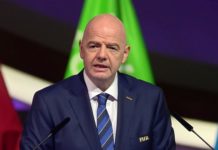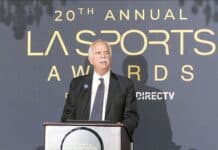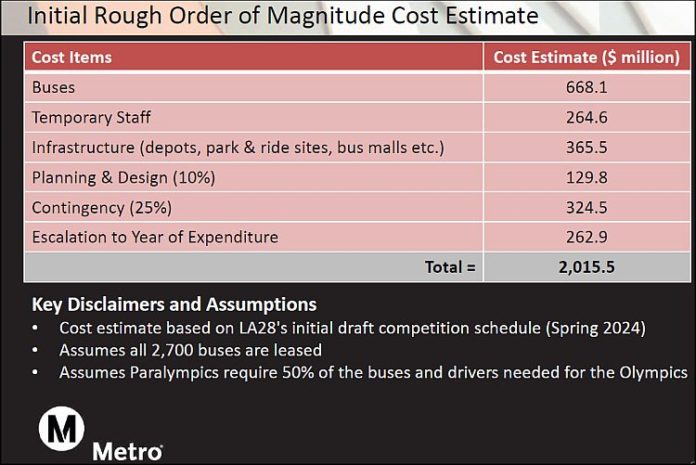★ The Sports Examiner: Chronicling the key competitive, economic and political forces shaping elite sport and the Olympic Movement.★
★ To get the daily Sports Examiner Recap by e-mail: sign up here! ★
≡ METRO ON EDGE? ≡
A contract for $42.04 million in “Games Support Services” to assist the Los Angeles Metropolitan Transportation Authority with planning for 2028 Olympic and Paralympic Games operations was approved by Metro’s Ad Hoc 2028 Olympic & Paralympic Games Committee on 14 May, with the London-based Mott MacDonald Group, which had long experience working with Metro on other projects.
There were only three bidders for this “task-based” project, with the “not-to-exceed” cost to cover a four-year period of 2025-26-27-28, through the Games. Mott MacDonald’s submittal outscored Jacobs Engineering Group and a Legacy 2028 consortium, and included 27 subcontractors, including 11 Disadvantaged Business Enterprises and Small Business Enterprises, and two Disabled Veteran Business Enterprises.
In terms of the actual assignments, the contractual “[w]ork will be authorized through the issuance of task orders, and each task order will contain a specific scope of services. A cost/price analysis will be performed, as appropriate, to determine price reasonableness.”
Based on the Ad Hoc Committee’s recommendations, it was expected that the agreement would be endorsed by the full Metro Board at its 22 May meeting last Thursday.
But it was not. The approval of the contract was withdrawn from the agenda without comment, one of two items so handled (the other was a $198.25 million Metro Bike Share Program agreement).
Although there was no explanation, it is possible that the second-placed Jacobs Engineering Group may have filed a protest over the scoring of the respective bids, which could delay final approval of the agreement. Technical questions have also been raised regarding the administration of the lengthy proposal process, as well as potential conflicts of interest.
¶
It may be that waiting on this agreement is the right thing to do for other reasons. Metro has asked for $3.2 billion in support funding for the 2028 Games from the U.S. Department of Transportation for Fiscal Year 2026, which begins on 1 October.
This specific amount gives a remarkable insight into the nature of government funding requests. The game is played this way: ask for considerably more than you think you will need, and when the request is cut down significantly, both sides can claim victory!
In the case of Metro and the 2028 Games, there is a sharp contract between the requests for funding seen at the end of 2022 and now.
In December 2022, a list of “priority projects” identified by the Games Mobility Executives group – a coordinating body among Southern California government transportation groups and the LA28 organizing committee – showed 15 items with a combined cost of $6.855 billion.
But only three of these were labeled as “Specific Games delivery need” items:
● $500 million: Supplemental Bus System
● $170 million: Countywide Mobility Hubs
● $85 million: Games Route Network Design & Implementation
Those three items add up to $755 million.
In the presentation to Metro’s Ad Hoc Committee on 14 May, those estimates have gone up considerably:
● $2,015.5 billion: Games Enhanced Transit System (buses)
● $80.0 million: Metro Mobility Hubs
● $210.9 million: Games Route Network
That’s now $2,306.4 billion, or more than triple the December 2022 estimate. Metro is also asking the U.S. Department of Transportation for other items as part of its $3.2 billion request:
● $216.0 million: Key Stations (9 locations)
● $130.3 million: Integrated Transit Management (combine two centers)
● $115.6 million: Transportation Demand Management (fare system)
● $101.7 million: First/Last Mile Improvements (4 locations)
● $80.0 million: Light Rail Improvements (5 locations)
● $41.0 million: Bus Priority Improvements (12 miles)
The White House, in its 2 May 2025 description of its Fiscal Year 2026 budget requests, noted requested additions to the transportation budget for aviation, highway, rail safety and shipbuilding projects, but did not mention any Olympic & Paralympic-related funding. Further, during the 14 May 2025 hearing before the House Appropriations Committee subcommittee on transportation with Transportation Secretary Sean Duffy, Olympic funding was discussed, but with no commitment on spending.
Rep. Pete Aguilar (D-California/San Bernardino) asked Duffy:
“Over the next couple years Southern California will also be host to the [FIFA] World Cup in 2026, Super Bowl in 2027 and the Olympics and Paralympic Games in 2028. You yourself have called these America’s Games; L.A. Metro estimates that the region will need over $3 billion in federal funding over the next three years to ensure public transportation network can support the athletes, the staff, the ticket holders and residents just for the Olympics alone.
“Last year the Senate included $200 million in transportation funding for the Olympics; President Trump signed a [continuing resolution] that funding was not included in the final funding package. Earlier this month, the California delegation and a couple of us here in the dais joined in sending a letter to the President asking for a budget request that included $500 million in dedicated infrastructure funding for the Olympics.
“Can you comment on the the status of how you view the Olympics from a from a dollars and cents perspective and will you commit to work with the California delegation as we work through FY26 and prepare for the ‘28 Olympics and these other events?”
Duffy replied with enthusiasm, but without any commitments:
“They’re going to be great. Our department is working with the White House, they have a task force for the World Cup as well as for the Olympics, and transportation is a key part of moving people where we have these massive events and so we are no doubt going to partner with California and your needs and with the administration and again, you guys have the power of the purse.
“I would look forward to all of us thinking through what those needs are because again this is our presentation to the world. The world’s going to come for both the World Cup and the Olympics and I know the President wants to have a great showing, a seamless showing and I think we want to invite the world for even for this summer for the for the [FIFA Club World Cup] and and to have them come in and, by the way, spend a lot of their money, would be wonderful but they have to have a wonderful experience with it, so we’re going to support the communities across the country with their transportation needs.”
Aguilar asked back, “You would support a funding level of around that $500 [million]?”
Duffy:
“I haven’t looked at the funding levels and what’s appropriate from the department’s
perspective but I want to make sure we have enough resources to make sure it’s seamless and I’d love to work with you if you have some ideas.”
Aguilar:
“I mean I appreciate the comment that it’s going to be great, but you know this body works with funding formulas and tables and real dollars out on the street to implement all the happy talk.”
Duffy:
“Of course, we have a skinny budget we were talking about today, so you know I’m happy to talk to you about it, but that was not on on the calendar for today, and so if you want me to look at the numbers. I’ll look at them and we can partner up together.”
No commitment, at least not yet and certainly not for $3.2 billion. The final Transportation Department budget is due at the end of May or early in June.
Lurking behind all of this is a note at the end of a 14 May attachment memo, “Games Enhanced Transit Service (GETS) Workstream Update,” stating:
“Building upon the precedent set in the Games Agreements between LA28 and venue cities, where LA28 commits to reimbursing for increased municipal services, Metro is pursuing a reimbursement agreement for the Games Enhanced Transit Service (GETS). This additional service represents a financial burden for Metro that would not otherwise be needed if not for the 2028 Games. This agreement will be part of the MOU that is executed between Metro and LA28.”
Metro clearly wants Federal money for the 2028 Games service program and whatever added money it can get for its other projects. But Transportation Secretary Duffy’s testimony two weeks ago indicated that Federal funding was not a priority, at least not yet.
¶
★ Receive our exclusive, weekday TSX Recap by e-mail by clicking here.
★ Sign up a friend to receive the TSX Recap by clicking here.
★ Please consider a donation here to keep this site going.
For our updated, 694-event International Sports Calendar for 2025 and beyond, by date and by sport, click here!



























